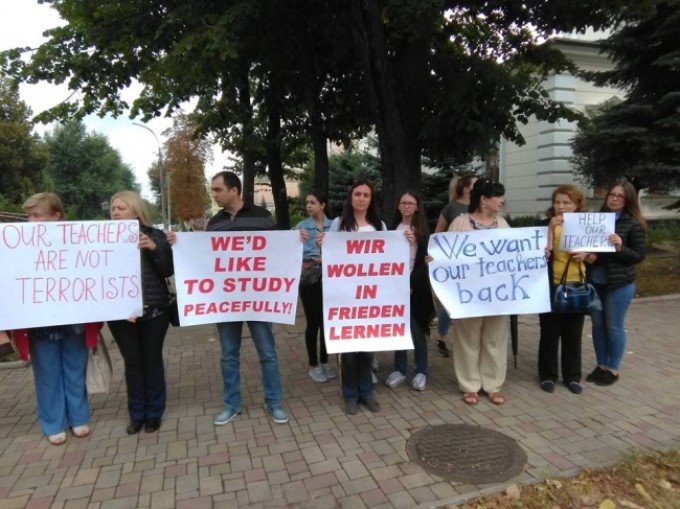Moldova’s prosecutor general will ask Turkish authorities to extradite the former leader of the Democratic Party (PDM), oligarch Vladimir Plahotniuc, who was allegedly behind the deportation of Turkish teachers in 2018, Nordic Monitor reported.
Plahotniuc, one of Moldova’s richest people, served three times as a member of the Moldovan parliament and moved to the United States in June 2019 after being pushed out of parliament as part of a government shakeup. Plahotniuc was accused of money laundering, fraud, leading criminal organizations and involvement in the theft of $1 billion from Moldovan banks in 2014-2015.
Prosecutor General Alexandru Stoianoglo had requested the extradition of Plahotniuc from the US; however, Plahotniuc departed the US on August 28 from Miami International Airport, RFE/RL’s Moldovan Service reported. According to an announcement by the office of the prosecutor general on September 29, Stoianoglo was “officially notified” that Plahotniuc had arrived in Turkey on September 10. The statement revealed that Turkish authorities would be asked for the extradition of Plahotniuc by the office.
Plahotniuc was also accused by Moldovan politicians of being behind the deportation of seven Turkish teachers in 2018, Necdet Çelik, a Bucharest-based Turkish journalist, reported. Çelik stated, citing local reports, that Plahotniuc had close links to Vasile Botnari, the former head of the Moldovan intelligence agency, and Turkish President Recep Tayyip Erdoğan.
In September 2018 seven Turkish teachers working for a group of schools affiliated with a faith based group, the Gülen/Hizmet movement, in Moldova were illegally detained and deported by Turkish and Moldovan intelligence authorities. The teachers then were transported to Turkey by Turkish intelligence officers and put behind bars. Intelligence officials reportedly targeted the teachers over a complaint filed by Turkish Ambassador to Moldova Halil Gürol Sökmensüer. The teachers were handed down jail sentences ranging from six-and-a-half to 12 years and are currently imprisoned in Turkey.
Botnari received a suspended sentence and a substantial fine over the rendition of the seven Turkish teachers to Turkey, Balkan Insight reported last month.

“I asked the court today for permission to make public at least the summary of the decision. Botnari was sentenced a month ago [and] received a suspended sentence,” Balkan Insight quoted Prosecutor General Stoianoglo as saying.
According to the Balkan Insight report, Botnari pleaded guilty in the case and took full responsibility for the orders he gave; however, Stoianoglo said he believes the former intelligence chief was influenced from the outside, suggesting that he was following political orders.
The Moldovan court fined Botnari, ordering him to pay 125,000 euros, the amount Moldova lost in the cases of five of the teachers that had come before the European Court of Human Rights (ECtHR). Botnari will pay a further 19,000 euros for the charter flight used to transport the seven to Turkey.
In August Nordic Monitor released a judicial document confirming that the Turkish teachers were charged with “membership in a terrorist group” by Turkish prosecutor Adem Akıncı in Ankara.
The teachers were convicted by Turkish courts on terrorism-related charges and are currently serving their sentences. For instance, Rıza Doğan, the director of a branch of the Orizont schools, was sentenced to seven-and-a-half years in July 2019. Doğan, who was accused of financing terrorism, had been living in Moldova since 1993.
Following the intelligence operation, five of the seven Turkish teachers appealed to the ECtHR, which in June 2019 fined Moldova for the abduction of the Turkish teachers at Turkey’s request. The court ordered the government in Chisinau to pay 25,000 euros to each of the five Turkish citizens who took their cases to the ECtHR for violating articles 5.1 and 8 of the European Convention on Human Rights. “Depriving the applicants of their liberty in this way amounted to an extra-legal transfer of persons from the Moldovan territory to Turkey which circumvented all guarantees offered to them by domestic and international law,” the court said.
In February Prosecutor General Stoianoglu addressed those teachers and their families in Turkish. “I am sorry that Moldova could not defend the fundamental rights of the Turkish teachers, and I hope it will be a lesson for all,” he said.
The ECtHR decision also underlined the fact that the Turkish ambassador to Moldova accused the Turkish teachers of terrorism.
Nordic Monitor also previously revealed how Turkish diplomats collected information on critics of President Erdoğan in Moldova and how intelligence reports have been used in criminal cases in the country.
According to the official police correspondence a company founded in Moldova was investigated as a terrorist entity, with reference to a letter received from the Turkish Foreign Ministry. The information gathered by Turkish diplomats in Chisinau was conveyed to the Turkish police by the ministry to initiate criminal proceedings against people who were named by the Turkish Embassy in Moldova.

According to official reports Turkey has sent 570 extradition requests to 94 countries in the last three-and-a-half years. Over 100 alleged members of the Hizmet/Gülen movement, a group inspired by Muslim cleric Fethullah Gülen, have been abducted abroad by Turkish intelligence and brought back to Turkey as part of the Turkish government’s global manhunt, according to a statement made by Turkish Foreign Minister Mevlüt Çavuşoğlu. They were reportedly subjected to torture and ill-treatment and were denied the right to a fair trial.
Recently UN rapporteurs Luciano Hazan, chair-rapporteur of the Working Group on Enforced or Involuntary Disappearances; Felipe González Morales, special rapporteur on the Human Rights of Migrants; Fionnuala Ní Aoláin, special rapporteur on the promotion and protection of human rights and fundamental freedoms while countering terrorism; and Nils Melzer, special rapporteur on torture and other cruel, inhuman or degrading treatment or punishment, sent a joint letter to the Turkish government to express their concern about the “systematic practice of state-sponsored extraterritorial abductions and forcible return of Turkish nationals from multiple States to Turkey.”
According to the UN document “[S]tate-sponsored extraterritorial abductions and forcible return of Turkish nationals from third countries may result in serious violations of the individuals’ rights to liberty, personal security, integrity and fair trial in contravention of the Universal Declaration of Human Rights (Articles 3, 5, 9 and 14), the International Covenant on Civil and Political Rights (ICCPR, Articles 7, 9, 13, 14, 18, 19 and 22) and the Convention against torture and other cruel, inhuman or degrading treatment or punishment (CAT, in particular Article 3), as well as the Declaration on the Protection of All Persons against Enforced Disappearance (Articles 2, 3, 6, 7, 13, 14 and 20).”
The UN rapporteurs also referred to “Article 7 of the Declaration [on enforced disappearance] stipulating that no circumstances whatsoever, whether a threat of war, a state of war, internal political instability or any other public emergency, may be invoked to justify enforced disappearances.”

















